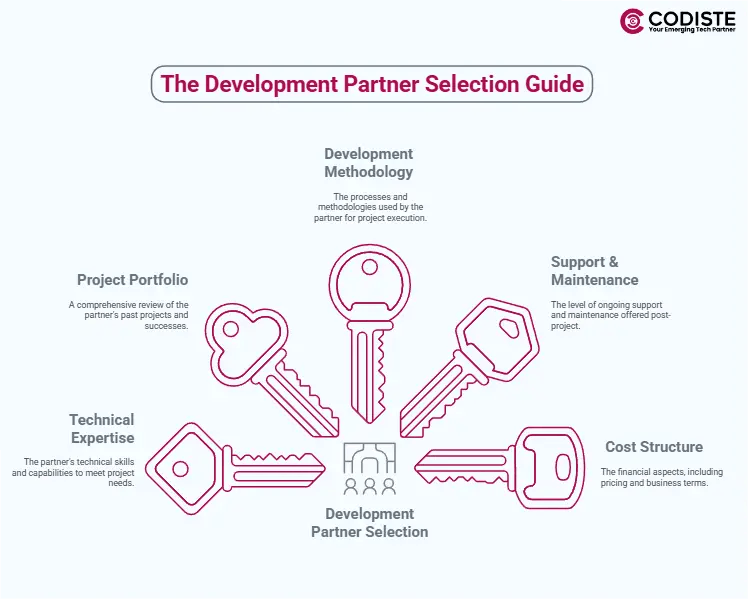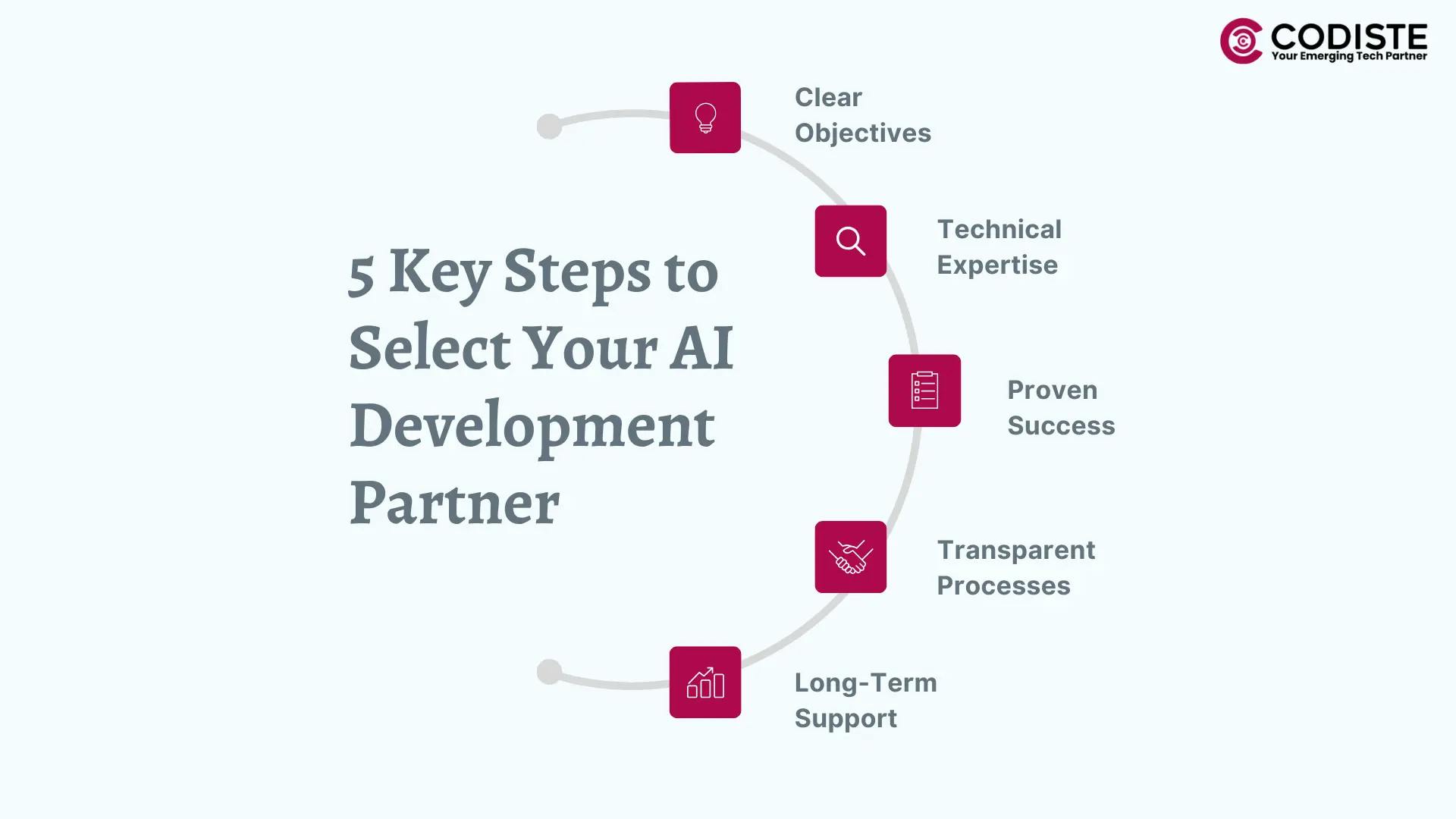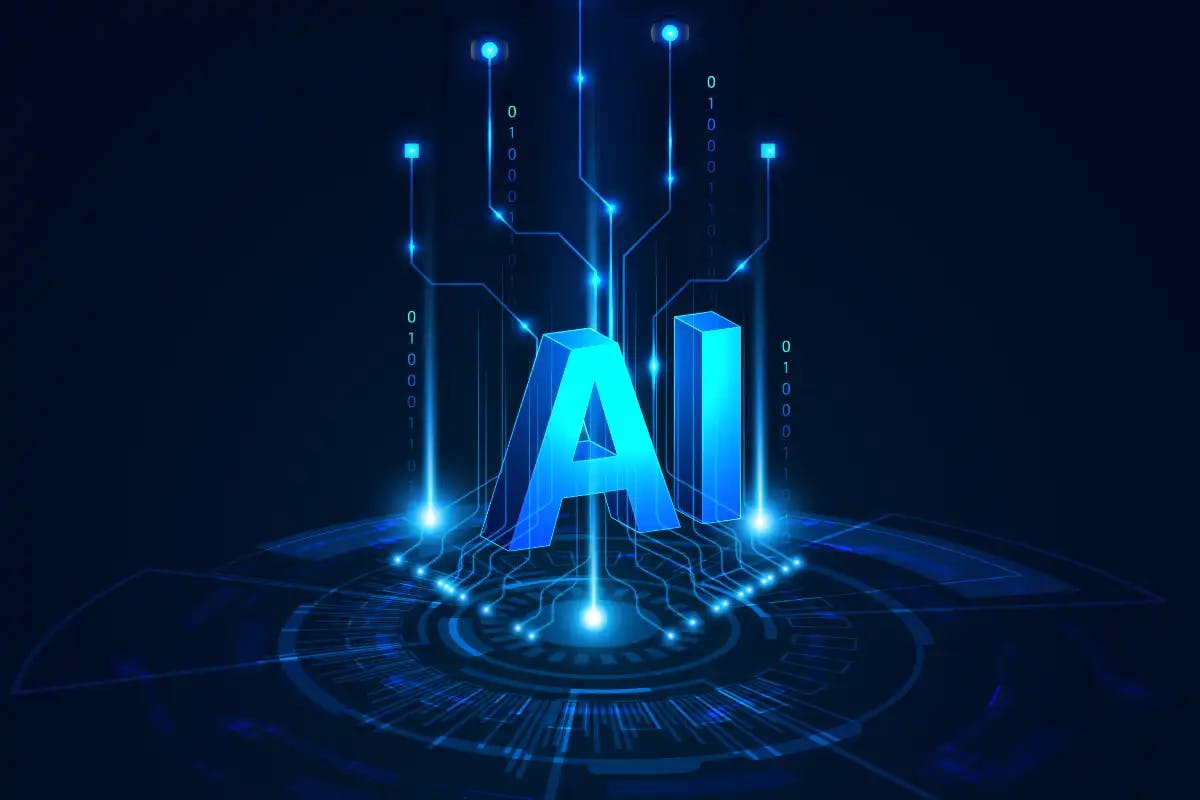


Technological advancements have made it imperative for enterprises to opt for solutions that can automate their business processes, and what can be a better option than the integration of AI? Every enterprise seeks to implement AI to enhance operational efficiency and drive growth. As competition intensifies, businesses must leverage technology to streamline processes and improve customer interactions.
Over 58% of Businesses already use AI to streamline operations or manage better customer relationship experiences.
- Small & Medium Business Trends Report, Salesforce
But it's not a walk in the park to create an AI agent that can meet your desired business requirements. Many factors need to be considered before one dives into tapping down the full potential of an intelligent AI assistant.
Before starting your journey, this article will take you through all the necessary factors.
Before you decide on the selection process, it's crucial to have a clear understanding of your business objectives. Ask yourself these key questions:
After you introspect on these questions, all you need to do is jot down your thoughts and then direct yourselves toward your business needs.
As an enterprise, overlooking AI usage can miss out on multiple benefits that can help decision-makers focus on other strategic shifts that require attention while automating routine tasks with AI agents. Here are the key aspects enterprises might miss;
Businesses that fail to integrate AI agents may face challenges in efficiency, cost management, customer satisfaction, decision-making, scalability, competitive positioning, and service consistency. Embracing AI technology is essential for sustainable growth in today's fast-paced business environment, allowing businesses to thrive and adapt to changing market dynamics.
The foundation of any successful AI implementation will always depend on your chosen partner's technical prowess. Here's what you need to look for to get the best from your AI agent development company
The right technological partner will either make or break it for your business; hence, it is a critical decision that can impact your operational efficiency and competitive advantage.
Technically, we have outlined this partner selection journey in 5 main parameters through which we get to know how our agent development partner should be. These are as follows.
Evaluate the technical proficiency of potential partners. Look for companies with a strong AI and machine learning background, utilizing industry-standard tools and frameworks. Assess their experience in developing AI solutions relevant to your specific industry, as this will ensure they can tailor their offerings to meet your unique needs. Inquire about their knowledge of data privacy regulations and security measures, as handling sensitive data is often a key component of AI projects.
When you check on the technological aspects of your agent development partner, you must look out for
1.Deep AI Knowledge
Your potential partner should demonstrate a thorough understanding of various AI technologies, including machine learning, natural language processing, computer vision, and reinforcement learning. They should be able to explain complex concepts in simple terms and recommend the most suitable solutions for your needs.
2.Technical Stack
Evaluate their proficiency with modern AI frameworks and tools. A competent company should be well-versed in popular technologies like TensorFlow, PyTorch, or other relevant frameworks specific to your project needs.
3.Innovation Track Record
Check if they stay current with AI advancements and have a history of implementing cutting-edge solutions. Their portfolio should showcase innovative approaches to solving complex problems.
Boost your business with AI make processes smoother cut costs wow your customers and stay ahead with Codiste by your side
Review the partner's project portfolio to understand their experience and success in delivering AI solutions. Look for case studies or testimonials that demonstrate their ability to solve problems similar to yours. When selecting the right AI development partner for your business, evaluating their past performance can provide valuable insights into their capabilities and potential for future success.
A partner with a proven track record in your industry will be better equipped to address the challenges you face and provide insights based on past projects. Here are key factors to consider:
1.Industry Experience
Choose a partner with a strong background in your industry or related sectors. Their familiarity with your business environment's unique challenges and requirements will enable them to tailor AI solutions effectively. An experienced partner will understand industry-specific regulations, market dynamics, and operational hurdles, ensuring their solutions are relevant and practical.
2.Case Studies
Request detailed case studies from potential partners that outline their previous AI implementations and must include the following:
3.Client References
Don't hesitate to ask for client references and take the time to contact them. Speaking directly with past clients can offer invaluable insights into the partner's working style, reliability, and ability to deliver results. This firsthand feedback can help gauge whether the partner aligns with your expectations and business culture.

Inquire about the development processes and methodologies the potential partner employs. A structured approach to project management, such as Agile or Scrum, can facilitate collaboration and ensure the timely delivery of solutions. Additionally, ask about their quality assurance practices to ensure the AI agents are reliable and effective upon deployment.
When evaluating potential AI development partners, consider the following key aspects:
1.Transparent Workflow
A reliable AI partner should have a clear and well-documented development process. This transparency ensures that all stakeholders are aligned and informed throughout the project. Key components of their workflow should include:
2.Data Security and Privacy
In today's digital landscape, data security is paramount. Ensure that your potential partner has a firm data handling and protection approach. Key considerations include:
Custom AI agent solutions might need good support and maintenance offered post-deployment. An ideal partner should be capable of providing continuous assistance, including monitoring performance, troubleshooting issues, and implementing updates as needed. This support is crucial for maximizing the value of your AI investment over time.
Ongoing support and maintenance are vital for the long-term success of your AI systems. Ensure your chosen partner provides the following:
Evaluate potential partners' cost structures, ensuring they align with your budget while providing clear value for the investment. Discuss pricing models upfront, including any additional costs for maintenance or upgrades. Understanding the business terms, including intellectual property rights and confidentiality agreements, is essential for establishing a transparent and mutually beneficial partnership.
Understanding the cost structure and business terms is critical to avoid unexpected expenses. Key considerations include:
When carefully considering these parameters—technical expertise, project experience, development methodology, support services, and cost structure - you can easily decide on the AI partner that aligns with your business goals and needs.
Choose Codiste for seamless AI solutions transparent workflows robust security expert support and cost-effective strategies tailored to your business needs
As businesses increasingly recognize the transformative power of AI, partnering with a leading AI development company becomes essential for achieving a competitive advantage
The final selection should be based on a balanced evaluation of the above factors. Create a scoring matrix that weights each aspect according to your priorities. Enterprises can even consider running pilot projects before committing to a full-scale implementation. This allows you to evaluate the company's capabilities firsthand and minimize risks.
Here are the key takeaways to watch out for
Before selecting an AI agent development company, businesses must clearly outline their objectives, use cases, and the level of AI integration needed. This foundational clarity helps align expectations and ensures the chosen partner meets the business's requirements.
The ideal AI-powered solutions provider development partner should have deep technical knowledge of technologies, including NLP, ML, and integration frameworks. Additionally, industry experience ensures they understand unique challenges and can offer tailored solutions.

Assessing a company's previous projects and case studies provides insight into its capability to deliver successful AI implementations. Look for measurable outcomes like improved efficiency, cost savings, or customer satisfaction.
Choose a partner with a transparent development process, including clear workflows, regular updates, and quality assurance measures. Data security and compliance with regulations like GDPR or CCPA are non-negotiable in protecting sensitive information.
Select a partner that offers post-deployment support, including system monitoring, troubleshooting, and updates. Clarify upfront about cost structures, ongoing maintenance fees, and intellectual property ownership to avoid unexpected expenses.
As businesses increasingly recognize the transformative power of AI, partnering with a leading AI development company becomes essential for achieving a competitive advantage. If you are looking for all the above parameters and considering a one-stop solution, contact us at codiste.
Our team has partnered with SMBs and startups of all kinds. If you are foraying into the unknown of agentic AI development, we are here with solutions that give you the needed edge. We have developed AI agents with 60+ enterprises to deliver tailored solutions that enhance efficiency and decision-making.
With a proven track record across diverse industries, we can help you make that impact—partner with us to transform your business ventures.




Every great partnership begins with a conversation. Whether you’re exploring possibilities or ready to scale, our team of specialists will help you navigate the journey.